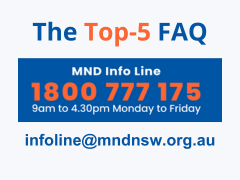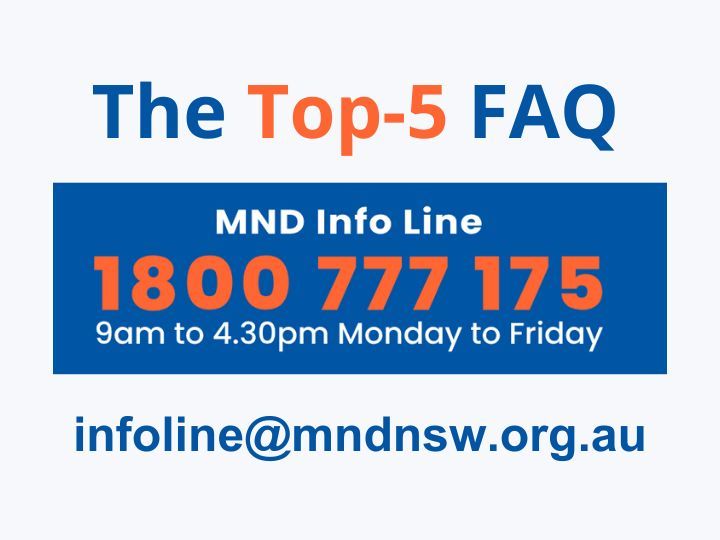The MND NSW Info Line was busy in August, with a range of topics covered in this month’s Top-5 including, questions about Riluzole, the MiNDAus registry, financial assistance for carers and Kennedy’s Disease.
1. How does Riluzole work, and what are the potential side effects?
Riluzole is a drug which is used to slow the progression of MND. Research suggests that Riluzole prolongs survival by 6 to 19 months, with the greatest benefit being seen when taken as close to diagnosis as possible.
Riluzole works by blocking the release of glutamate which is a neurotransmitter. Glutamate stimulates motor neurone cells which causes them to send signals. It is thought that for people with MND, motor neurones release too much glutamate which overstimulates the neurone causing them to deteriorate and die.
Riluzole is prescribed by a neurologist. Riluzole will not be suitable for everyone with MND.
Side effects may occur. Side effects may include fatigue, nausea and changes to liver function, amongst others. If you do experience any side effects when taking Riluzole, speak to your neurologist, general practitioner or your allied health care team.
For further information, visit:
2. What is the MiNDAus registry?
MiNDAus is a platform that enables people to register themselves and maintain the latest information about their condition and support. If permission is provided by those on the registry, information is passed onto the MiNDAus Clinical Registry as well as other research programs. This tool is used to investigate MND and assist in developing evidence-based policies to advance care and research.
For further information regarding the registry, visit:
3. I am a carer; can I get financial assistance from the government?
Yes, if you are caring for someone with MND, there are different financial payments or allowances that you may be able to receive.
- Carer Supplement: a $600 annual payment if you have caring responsibilities and get certain carer payments, including Carer Allowance and Carer Payment.
- Carer Allowance : supplementary payment if you care for someone who needs daily support for at least 12 months or has a terminal medical condition. The Carer Allowance is $153.50 paid fortnightly.
- Carer Payment: is an income and asset tested payment that provides carers who are providing constant care to someone for at least 6 months or constant care for someone at end of life. The amount of carer payment that you receive depends on personal circumstances.
For further information, visit- Caring for someone - Services Australia
4. Can I still access the NDIS after I turn 65? (if I am already an NDIS participant)
Yes, if you are an NDIS participant and turn 65, you will continue to access NDIS supports. Your NDIS funding will continue unless you decide to withdraw from the NDIS and choose to access support through My Aged Care (MAC).
5. Is Kennedy’s disease different to MND?
Yes, Kennedy’s Disease is a disorder of motor neurones, however it is not motor neurone disease. It is an inherited disease which causes slow progressive weakness and muscle wastage. Symptoms of Kennedy’s disease include; muscles cramps, hand tremors, swallowing and speech difficulties. The age of onset is usually between 35 to 40 years and does not usually impact life expectancy.
For further information, visit:
- Kennedy’s Disease MND Connect
- Contact the MND NSW Info Line on 1800 777 175.
Ask us a question!
Get in touch with us via 1800 777 175 or
Your question might be in our next month’s Top-5!




